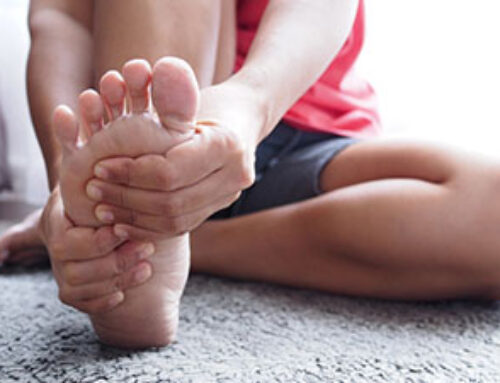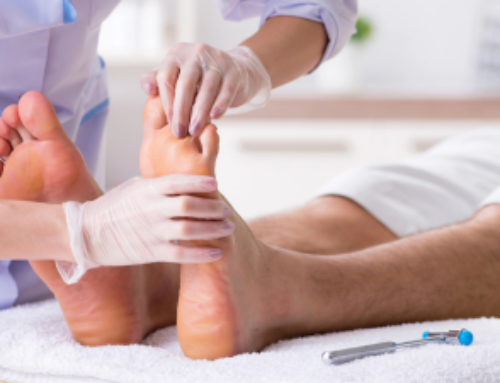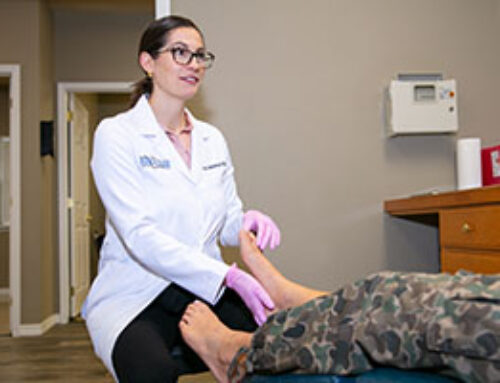You’re trying to get a good night’s sleep, but foot pain is keeping you awake. Or maybe you are jolted by a sharp pain in your heel as you take your first steps out of bed, preventing you from waking up gradually. You could be suffering from any of several conditions that lead to aching, stinging, or burning sensations in the feet. Foot pain may occur at night even if you don’t have it at any other time of the day. In fact, there are specific reasons why you may feel certain types of foot pain at night. Let’s look at why certain types of foot pain are more common at night and immediately after waking up.
7 Common Causes of Foot Pain at Night
Peripheral neuropathy
Peripheral neuropathy is a condition resulting from damage to your peripheral nerves which reach into your arms and legs. It is most commonly caused by injuries, infections, and diabetes. Symptoms include pain, weakness, numbness, burning, or “pins and needles” in your legs and/or feet. These symptoms are similar to those of paresthesia, which you may have felt after your leg “fell asleep” from reduced blood circulation. But where paresthesia usually goes away in a few minutes, peripheral neuropathy can be chronic. The pain is often at its worst at night because your feet have been under pressure for the entire day.
The symptoms of peripheral neuropathy can be alleviated by addressing the root cause. This may be through better blood sugar control, vitamin supplements, or resting to help your body recover from an injury. Oral and topical medications are also available to help alleviate pain.
Alcoholic neuropathy
Peripheral neuropathy might also emerge from excessive alcohol consumption, in which case it is called alcoholic neuropathy. This is notable because alcoholic neuropathy also carries some unique symptoms in addition to the ones already listed, alcoholic neuropathy includes muscle spasms and a loss of muscle control. Alcoholic neuropathy may respond to similar treatments as other types of peripheral neuropathy, but the most important thing you can do is cut back on alcohol consumption.
Reflex sympathetic dystrophy
Reflex sympathetic dystrophy (RSD) is the result of an overactive nervous system. After a foot injury, it’s normal for your body to send out signals that cause pain – this is the body’s way of telling you something is wrong. But with RSD, the nervous system essentially over-corrects and sends excessively strong signals. This has a variety of effects including stiffness, swelling, a burning sensation, and muscle weakness. Overall, the pain may be worse than the original injury. Medications, anesthetic injections such as cortisone, and physical therapy can all help to manage RSD.
Plantar fasciitis
Plantar fasciitis is a condition that occurs when the plantar fascia, a band of tissue that supports your foot’s arch, becomes inflamed, causing a sharp pain in the heel. The pain is usually at its worst when you first start moving after long periods of rest, as tension forces the plantar fascia to suddenly stretch after shortening. This makes the morning the perfect time for symptoms to emerge. People with plantar fasciitis may find that their first few steps in the morning are excruciating.
Overexertion and a collapsed arch are common causes of plantar fasciitis. You may find relief by applying ice to reduce inflammation and by resting to let the plantar fascia heal. Specialized exercises can help to stretch and strengthen the plantar fascia. A podiatrist may also prescribe custom-made orthotics to give your shoes more arch support.
Pinched nerves
Pinched nerves can be a major cause of foot pain at night. The nerves running through your tarsal tunnel in your ankle may be compressed, causing pain similar to carpal tunnel syndrome in your wrist. But the pinched nerve doesn’t necessarily have to be in the feet to cause pain there. If the sciatic nerve in your back and legs is compressed, the pain can radiate all the way down to the feet.
The pain from pinched nerves may be caused or aggravated by your sleeping position if you put excessive weight on a particular area. Adjusting your position, even a small amount, can make a big difference. Applying ice and massaging the affected area may also help. Nerves may also be pinched as the result of an injury. In these cases, the injury itself must be addressed.
Morton’s neuroma
Morton’s neuroma results from a specific type of nerve compression. When your toes don’t have enough space to breathe, your third and fourth toes may be jammed together. As a result, the nerves are compressed from thickened tissue and become inflamed. The affected toes may go numb or feel like they’re burning, and you may also have pain in the ball of your foot.
Morton’s neuroma affects women more than men. This may have something to do with women’s footwear, which is more likely to put excessive stress on the feet. To prevent Morton’s neuroma, wear shoes that give your toes plenty of space and avoid high heels whenever possible. Medication and steroid injections may help to provide relief. In extreme cases, surgery may be necessary to decompress or even remove the nerve.
Pregnancy
Pregnancy brings about a number of changes to the body that may result in foot pain. The body consumes more calcium than normal, leaving less in the bloodstream, and it is thought that calcium deficiency may contribute to foot cramps. These cramps can be alleviated with mild stretches and exercises. Pregnancy also causes the body to retain more fluid than normal. This may bring on edema, a condition in which your feet and ankles swell; the skin may also take on a shiny appearance. Excessive salt consumption may worsen the symptoms of edema, so ensure you’re not eating too much of it.
Preventing and treating foot pain at night
Each of the conditions listed has unique causes and treatments, and some remedies will require treatment from a doctor. However, there are some easy, general tips you can follow at home to help with foot pain and reduce the likelihood of developing it.
- Drink plenty of water. Staying hydrated will help you to avoid muscle cramps and swelling.
- Stretch and exercise an inflamed area. This will increase blood flow, helping your circulatory system to remove toxins and deliver nutrients.
- Apply ice to reduce inflammation.
- Wear shoes that provide arch support and give your toes space. Ill-fitting footwear is a root cause of many types of foot pain.
- Sleep flat on your back to distribute your weight evenly and avoid placing too much pressure on a single area. If your feet still hurt after adjusting your position, try elevating them with a pillow.
A lack of sleep can cause a multitude of other health problems, so it’s important to get to the bottom of what’s keeping you awake. Schedule an appointment with Metro Tulsa Foot & Ankle Specialists today so we can help you get back to sleep pain-free.
Subscribe to stay up-to-date on news and tips from us.





